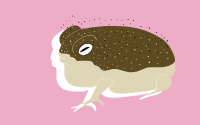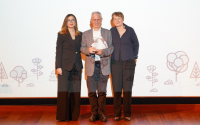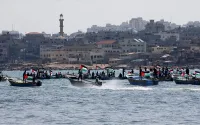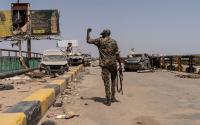7 November 2005Mark Ealey
While the debate about the use of children in war is relatively new, the practice is ages old. Long before education became a right rather than a privilege it was common for boys to be recruited into the military in roles that saw them face death at the front line. Joining the army or navy was the accepted fate of many young lads from poorer backgrounds, and in that respect, the boys who carried armor for Spartan hoplites or stood watch on a juggernaut at Jutland had much in common. Nowadays, insurgents and pro-government militia groups throughout the world use brutal coercion to recruit children. Boys and girls are forced to carry supplies, act as spies, messengers or lookouts, and in extreme cases, even to serve as human mine detectors or to take part in suicide missions. In addition to those who volunteered at a young age, ending up as drummer boys at Waterloo or Gettysburg, and the contemporary boy soldiers compelled to fight by their masters in Sierra Leone, East Timor or Angola, there is a third category, a group caught up in a whirlwind of nationalist fervor, "willingly" answering the call to face an invading enemy portrayed by propaganda as being bent on total destruction.
Two very familiar instances of this third scenario stand out in 20th century history. As the pool of adult males available for conscription dwindled in Germany and Japan in early 1945, both of these beleaguered nations used children in military and paramedical roles. Powerful images circulate of Hitler Jugend boys with panzerfausts cycling through the rubble-strewn streets of Berlin or Japanese boys and girls training to meet the enemy with sharpened bamboo sticks. The "willingness" of these children to hurl themselves at Soviet or American tanks in no way mitigates the tragedy of youthful patriotism being wasted in the end-game madness of a manipulative adult world.
Yoshimura Akira's historical novel, Junkoku -- Rikugun Nitõhei Higa Shin'ichi (Translated as "The Martyrdom of Private Second Class Shin'ichi Higa") looks at the Japanese and Okinawan experience of the eighty-day Battle of Okinawa through the eyes of 14-year old Higa Shin'ichi. Yoshimura graphically depicts the tragic involvement of the boys of the Blood and Iron Student Corps and the girls who attended the wounded as nurse-aides of the Himeyuri Student Corps. Approximately 2,000 Okinawan high school students were mobilized to support the Imperial Japanese Army in the defense of Okinawa. Only half of them survived.
Depending upon how one looks at this battle, it may actually be more appropriate to state that "as many as half survived." The odds were heavily stacked against them coming through alive. By 1945, American tactics placed greater emphasis on delivering overwhelming firepower from air, sea and land to suppress stubborn resistance by Japanese dug in in caves throughout the main island and to borrow a euphemism coined during the Vietnam War, "collateral damage" among Okinawa's civilian population reached horrific levels. In addition, at least partly because of the nature of the fanatical resistance on Saipan, Iwo-jima and Peleliu, the U.S. forces in Okinawa fought as much to exterminate the enemy as to secure territory. When we add to this the fact that the Imperial Japanese Army encouraged and at times forced the local inhabitants to commit group suicide rather than be captured and that it often claimed shelters and caves from civilians, the scene was set for the closing stages of the battle to be an enormous tragedy. Over 250,000 Japanese died, including approximately 150,000 civilians -- a one quarter of the island's population.
The translation of Yoshimura's book is timely for two reasons: firstly because 2005 marks the sixtieth anniversary of the Battle of Okinawa and secondly because any literature that encourages us to look at "zealotry" from another angle must help us come to grips with the challenges of the early 21st century.
Yoshimura Akira is a prolific writer of documentary-style historical fiction. Many of his works focus upon aspects of the human condition set against a backdrop of Japan's involvement in the Second World War.
New Zealander Mark Ealey is a freelance translator specializing in Japan's foreign relations. "The Martyrdom of Private Second Class Shin'ichi Higa" will be his sixth book-length translation and his third historical novel by Yoshimura, following on from "Shipwrecks" (1996) and "One Man's Justice" (2001.) Here is a portion of Chapter 3 of "The Martyrdom...describing the withdrawal from the Shuri Line. This article was written for Japan Focus.
Chapter Three
Where the order came from wasn't clear, but it was quietly communicated among the nurses with a kind of ominous finality. It was short and to the point: "Move out, taking those who are capable of walking unaided." The hidden meaning was of course: "Leave the seriously wounded where they are."
An awful tension and growing panic started to spread amid the filth and stench of the hospital caves. The wounded had already been given the straightforward instruction: "All those who can walk, get outside now." Whether they understood what was afoot was not clear, but an eerie atmosphere fell over the place. Those patients who, minutes earlier, had been pestering the young nurses for water, fresh bandages or bedpans, had gone quiet and were now lying still on their beds.
Shin'ichi and his friends helped the girls lead the walking- wounded outside, sensing the agonizing silence of those who were unable to get up from their beds.
Everyone knew that the field service code prescribed that those unfortunate souls who were wounded in battle should bravely take their own lives rather than be captured by the enemy. Even so, the thought that the several thousand patients they were about to leave behind would have no choice but to commit suicide weighed heavily on his conscience.
Those feelings were then blown away in an instant. A messenger, covered in mud, ran into their midst from the eastern section of the cave complex, about two hundred meters away. Panting for breath, he shouted: "You've gotta get out of here now. The enemy's starting to come into the cave from the east."
There was a frenzy of activity as Shin'ichi and his friends rushed to get the walking-wounded out. As they helped the soldiers down the middle of the cave, the doomed on both sides stretched out their arms imploringly like dozens of pallid tentacles. Shin'ichi knew all too well what they wanted, but he pushed his way forward as fast as he could.
"Nurse, thank you for what did for me," the badly wounded men called out as the young girls made their way outside. The girls nodded, wiping away the tears rolling down their cheeks.
Once those capable of walking were all outside, a couple of medics in a corner a short distance from the entrance started hurriedly adding drops of something to small bottles of condensed milk. The girls standing by sobbed uncontrollably as they watched, knowing that three of their classmates were being left behind among the seriously wounded. When they realized that cyanide was being put into the milk so the patients could take their own lives the girls had tried to carry their friends out, but the wounded girls had refused, telling them, "Get out. Look after yourselves."
One of the medics screamed at the girls when he saw them standing there. "What the hell are you doing? Get out there and help the walking-wounded!"
Outside in a field, a thin black line moved slowly through the pelting rain. In among them there were girl students, carrying bags of medical supplies suspended from the ends of poles, or helping wounded men walk through the mud.
To keep stragglers to a minimum each person in the line took hold of the rope that gave the line its form. When Shin'ichi caught up with the last people in the line he grabbed the end of the rope dragging behind them.
The sound of machine gun fire rang out behind them. Startled, Shin'ichi looked back in the direction of the hill, but couldn't see any enemy soldiers.
His gaze shifted to the slope where the hospital caves were and, in the light of an illumination shell, he caught sight of a group of people bunched closely together as they moved down the slope.
For a moment he thought that they must be the enemy, but their movement was far too slow and labored for enemy troops. The harder he looked the more it seemed that the whole slope was covered in moving forms.
A shiver ran down his spine. The badly-wounded were crawling down the slope after them. These men must have dragged themselves out rather than take their own lives inside the cave -- or maybe they thought that they could still fight. Shin'ichi let go of the rope and stood still, gazing through haunted eyes at the painstakingly slow movement back there.
The rain intensified and the dark spots on the slope became harder to make out. The line of people moving in front of him was veiled in spray from the pouring rain.
The line of wounded advanced at a snail's pace. When those capable of walking had been ordered outside, men far too badly wounded to seriously consider standing unassisted had somehow managed to drag themselves out of their beds and join the group outside. Every movement was agony for these men, slipping to their knees in the mud time and time again as they struggled forward. Each time Shin'ichi saw a man slip he would run over and help him back to his feet.
The road was visible in front of them, but enemy warships were shelling it.
"Let go of the rope! We've got to spread out or these shells will get us all!" A shrill voice from the front of the line was heard above the sound of the rain.
Shin'ichi hurriedly pulled the rope out of the wounded men's hands.
Finally, the men started moving from the field up on to the road in an extended line.
Before he knew it, Shin'ichi found himself propping up a burly, middle-aged man as he walked. The man's head was swathed in bandages that obviously had not been changed for some time. The fat, white bodies of maggots could be seen moving in the gaps in the filthy cloth. Maybe the maggots moving around made his wound itchy, but every so often, the man would groan as he rubbed the bandages with his fingers. Each time he did this, the foul odor of the pus from the festering wound became more pronounced.
Trudging through knee-deep mud with the weight of the man bearing down on him made Shin'ichi feel so exhausted that he felt that his knees might give way at any moment. The man was incredibly heavy and Shin'ichi seemed to be supporting almost every pound of him as he walked.
Just when they came to a bend in the road, a few meters ahead of them, Shin'ichi saw an emaciated soldier topple over sideways like an old tree that has snapped at the ground. He tried to free himself from the man he was supporting so he could run and help the wounded soldier, but the man held him in place with a surprisingly strong grip. Shin'ichi could feel the man pulling him against his body.
Shin'ichi twisted his neck to look up at the man's face. The bandages hid too much to distinguish any facial expression, but between the strips of cloth he could see a look of fierce determination in the man's eye not to let go of this boy who was keeping him upright.
A feeling of panic ran through his mind. This man was clearly trying to stop Shin'ichi from helping the other wounded soldier. Judging from the strength of his grip on his shoulder, the man had more than enough energy left to walk unaided. Nevertheless, he was clinging on to his young helper's shoulder, determined not to let go.
Shin'ichi was amazed. He had always believed that right from the very start of the war, every soldier and civilian -- without exception -- had shared a common resolve, and that that resolve was born of the willingness by everyone to sacrifice themselves for the cause. But here was a man who obviously still had the ability to walk by himself, happy to leave a comrade by the wayside. It just didn't make sense.
Still trapped under the man's wing, Shin'ichi edged his way closer to the soldier lying beside the road, stopping when they came level with him.
He was lying on his back almost submerged in the mud. Indifferent to the rain falling on his face -- his eyes were wide open and his mouth moved ever so slightly.
"That feels good. The air's so good," he said, a hint of a smile on his face. Released from the stench of pus and excrement that hung in the stagnant air inside the cave, the young soldier seemed overjoyed to feel the cool rain on his face under the night sky.
The man's head sank back into the mire, muddy water flowing across his eyes and into his mouth until his face was completely covered.
The burly man tightened his grip on Shin'ichi to urge him forward along the road. Shin'ichi started walking again.
An unbearable feeling of disgust towards this man welled up inside Shin'ichi. Maybe it was to stop him escaping, but the man seemed to be bearing down on him far more heavily than necessary. This pushed his feet deeper into the mud, but when he got stuck the man would pull Shin'ichi's small frame up so he could move forward again.
All of a sudden two shells fired from offshore slammed into the ground and exploded on either side of the road ahead of them. There was a huge flash and the blast hurled Shin'ichi and his captor into the mud. The shockwave from the explosions was such that for several seconds the sky rained mud and dirt.
Bodies moved all over the road, as people staggered back to their feet and formed a line again, but many remained lifeless where they had fallen.
"Come on! Get up or I'll kill you!" screamed the young officer in charge of leading the group, drawing his sword and striking the fallen soldiers with the back of the blade as though demented.
The line moved forward again.
The man, now covered in mud from his bandaged head to his feet, shuffled forward, holding onto Shin'ichi's shoulder with an even stronger grip than before. As they walked, it wasn't long before Shin'ichi sensed a look of naked fear in the man's eyes.
Shin'ichi felt like laughing in the man's face. Wounded and weak though this man might be, someone who propped himself up on a boy half his size and was terrified of every incoming round, was not fit to be called a soldier. No doubt, Shin'ichi thought, this man's wounds were the result of an act of cowardice rather than bravery in combat. Shin'ichi had been in the Student Corps for less than two months now, but he felt no fear of the enemy and neither did any of the other boys around him.
The man wasn't wearing any badges of rank, but Shin'ichi imagined that he must be a sergeant or a low-ranking officer. From the way he grabbed hold of Shin'ichi and controlled his movements, he must be of a rank used to giving orders and being looked after. If that were the case, then he should be trying to encourage the other wounded men and taking the lead in the withdrawal.
Once they passed the Yamakawa Junction -- of which he had a vague recollection -- the line quickly lost its form and every step became a struggle. Shin'ichi sensed himself losing the feeling in his legs and shoulders and fading in and out of consciousness. The man was now panting heavily and would occasionally stop to catch his breath. Just when Shin'ichi was wondering how far they had walked, he heard a voice above the sound of the explosions and the rain.
"Put the wounded and the medical supplies on to the trucks!"
"Trucks?" said the man in a thin, rasping, almost feminine voice, quite unbefitting such a large man. It was the first time Shin'ichi had heard him utter a word. The man looked up and still leaning heavily on Shin'ichi, started walking in the direction of the trucks.
There were two trucks parked in the lee of a hill. It was a well-chosen spot to avoid shells fired from warships and there was a crowd of people milling around the vehicles.
Once they got a little closer, Shin'ichi could tell that most of the people were civilians. They were covered from head to toe in mud, making it impossible to know whether they were male or female. Very few of them were holding any belongings, and many were squatting on the ground with small children strapped to their backs.
They looked up despondently at the trucks, which were obviously reserved for the wounded soldiers. The flat-decks of both vehicles were full of soldiers lying prone, exhausted from just getting up there, and the rearmost part was literally piled up with wounded men.
The man put his hands on the tailgate and said to Shin'ichi, "Push me up!" Knowing that this meant he would finally be free from his captor, Shin'ichi pushed with all his might against the man's mud-covered backside. Once up on the flat-deck the man stepped over bodies to make his way forward and sat down behind the drivers cab, not once looking back at Shin'ichi.
Before long, the trucks pulled away, shaking their human cargo as they moved. As he was splattered with mud from the truck's tires, Shin'ichi allowed himself to mutter a profanity about the despicable character he'd just seen off. All around him wounded soldiers who had been unable to get on the trucks sat, exhausted, in the mud. The man Shin'ichi had helped was oblivious to the plight of others, shamelessly focussing only his own survival.
Dog-tired, the girls were sitting among the wounded soldiers in the mud -- a bizarre scene, where the mire and the people in it seemed to have melded into one.
"We're moving out!" shouted the young subaltern and the mud-covered human forms slowly got to their feet. The nurse-aides lent their shoulders to the most badly wounded and picked up the remaining medical supplies.
Shin'ichi slipped under the shoulder of an emaciated soldier who had lost his right hand. The soldier turned slightly to face Shin'ichi and bowed his head, so exhausted that even uttering words of gratitude was beyond him. The dark forms of Yaeju-dake and Yuza-dake loomed into view.
As the line lost its form the number of stragglers increased -- some had sat down in the mud to rest and others were bent over on all fours trying to catch their breath. Shin'ichi could do nothing for them. He was now barely capable of supporting the soldier he was with.
Not far from the hamlet of Yuza the officer instructed them to take a short rest so they could then get the line back into some semblance of order. Shin'ichi and the wounded soldier collapsed on to the ground. Before they had even rested ten minutes, several illumination shells burst in the night sky, closely followed by high-explosive rounds from the warships off shore. Staying huddled together was too dangerous, so they moved off again in line. Maybe it was because they had had a rest, but Shin'ichi felt as though his muscles were seizing up and his feet felt as if they were encased in lead.






